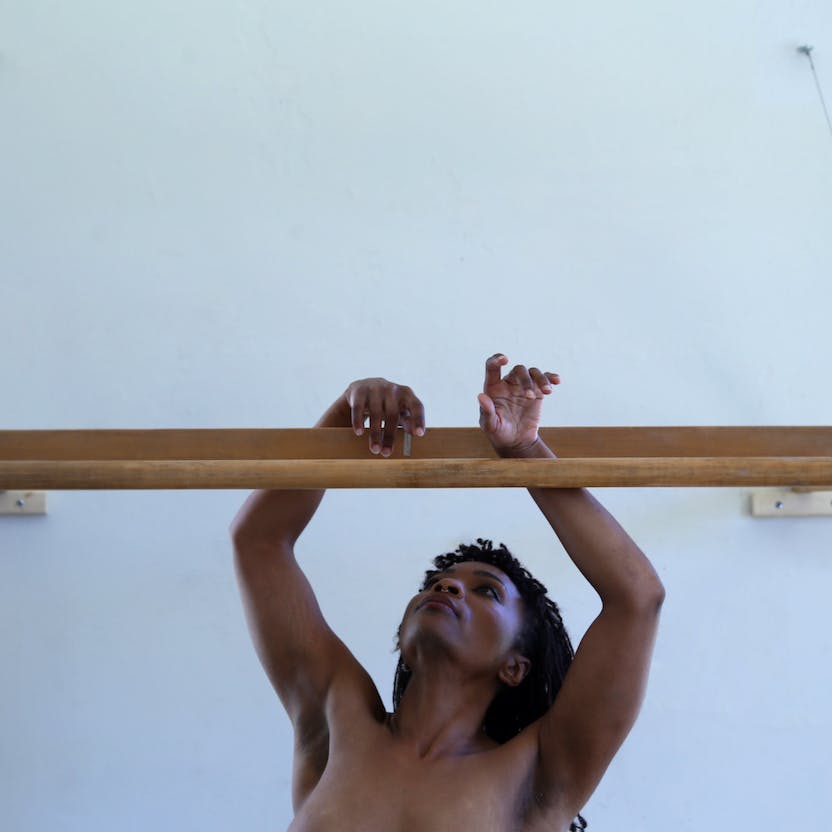Indira Allegra: A Letter From Penelope
Indira Allegra: A Letter From Penelope
Photo courtesy of the artist.
To mark one year since the start of the COVID pandemic, we asked Allegra (pictured above) to write a letter to our readers. In the letter, published below, they drew upon Homer’s epic poem Odyssey, in which Penelope spends 20 years weaving and unraveling a burial garment—and fighting off 108 suitors—waiting for her husband Odysseus to return home from the Trojan War.
—The Editors
My Friend,
Odysseus is not a man but an aspect of myself who has gone out to sea. My grieving self. As Penelope, I can tell you that the suitors were not people either—but distractions from the grief I have been using my performance of threadcraft to attend to. It is tempting to believe Homer’s version of my life—that I would suffer a longing for an absent spouse for 20 years, weaving and unraveling a shroud to evade the advances of other suitors to prove my fidelity. But it’s not like that.
There are mornings where you wake knowing part of yourself has simply departed and it will be a while until your body feels like a home to you again. It is a time for mourning—an outward display of grief that might otherwise go unseen by others. It could have been The Need To Fight that called you to sea. Maybe it was the presence of Other Temptations, terrible consumptions that caused your mourning self to slip out onto open water in search of comfort. Whatever it was for you, My Friend, the way to nourish ourselves moving forward is to call all parts of ourselves home by reaching for whatever material feels like it is touching us back—pressing us back into ourselves. Craft is not about the object, so much as it is about our relationship over time with that which touches us back.
My suitors, on the other hand, sought a kind of extractive touch. There were 108—each an elaborate excuse to abandon my grieving self. My Friend, do not abandon your grieving self. The fidelity that matters in this story is about maintaining the fidelity to one’s own grieving process. And it takes time. We can nourish ourselves this spring by loving our grieving selves and reminding them that they belong Home with us also as we learn to coexist with a changing virus and build a world that is better than the “normal” that came before. Without a regular commitment to attending grief when it arises—we cannot meet the moment.
I cared for my mourning self by turning to thread to mark the passage of time and my feeling of suspension within it. I needed the gentle hiss of weft being pulled from the shroud. That flossing of the warp was a way for me to weep quietly at night while I waited for the part of myself I call Odysseus to return back to the Home of my body. The performance of weaving and unraveling was the memorial I needed, not the shroud. I needed to show people I was unraveling inside, and this honesty was the most nourishing thing.
I believe we can use materials to perform the memorials we need, which come out of our bodies’ own unique relationship to grief. The era of solely relying on larger-than-life physical memorials in public squares to represent a “universal” experience of grief is waning. Each of us needs to take responsibility for making our own memorials specific to our own experiences of loss. Those of us who have skills as makers are especially gifted to meet the moment.
We can craft new mythologies for the world we want to live in with the understanding that loss will always be a normal part of lived experience. We can use the qualities of courage and patience which are cultivated through our art practices to take an honest assessment of the historical materials we have been offered—soaked as they are with complexity—and learn how to transform them into something that, if nothing else, adds meaning to our lives. And I believe a life of meaning may be the most nourishing thing of all.
Come. Let us all meet on the shore of this spring and face the horizon to call ourselves Home to ourselves.
With great love,
The Weaver
—Indira Allegra
More From Indira Allegra
Indira Allegra is a speaker in our American Craft Forum coming up on April 1. Don't miss this oppportunity to hear them share about their practice in dialogue with other artists and leaders in the field. Register here.
Indira is also one of nine artists featured in Desire Paths, an exhibition on view at Center for Craft in Asheville, North Carolina, February 5–May 28, with virtual tours available. Learn more here.


